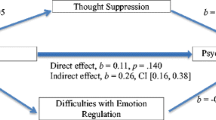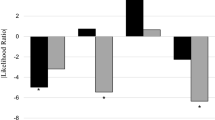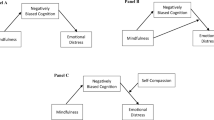Abstract
This study investigated mindfulness in relation to self-defeatist beliefs and negative symptoms, with the hypothesis that mindfulness has a moderating effect. Three hundred and thirty-one patients with schizophrenia were recruited from a public mental health hospital. All were interviewed by experienced research assistants and completed self-report questionnaires after giving informed consent. Self-defeatist beliefs, negative symptoms, and mindfulness were measured, and descriptive analyses and hierarchical regression analysis were conducted. Our results demonstrated that self-defeatist beliefs were highly related to avolition, affective flattening, and apathy of negative symptoms related to diminished experience, while no significant relationships were found between self-defeatist beliefs, alogia, and attentional impairment. We also confirmed the effect of mindfulness on negative symptoms, but unexpectedly, the moderating effect of mindfulness could not be supported in the present study. Emotional regulation and dysfunctional beliefs could be important for the development of negative symptoms. The effect of social cognitive deficits on self-defeatist beliefs, mindfulness, and negative symptoms, as well as the differential effects of mindfulness-based interventions and cognitive behavioral therapy on negative symptoms, should be investigated further in the future.

Similar content being viewed by others
Data Availability Statements
Data sharing not applicable to this article as no datasets were generated or analysed during the current study.
References
American Psychiatric Association. (2013). Diagnostic and statistical manual of mental disorders (5th ed.). Author.
Andreasen, N. C. (1982). Negative symptoms in schizophrenia: Definition and reliability. Archives of General Psychiatry, 39(7), 784–788.
Andreasen, N. C. (1989). The scale for the assessment of negative symptoms (SANS): conceptual and theoretical foundations. British Journal of Psychiatry, 155, 49–52.
Beck, A. T. (2004). A cognitive model of schizophrenia. Journal of Cognitive Psychotherapy, 18(3), 281–288.
Beck, A. T., Grant, P. M., Huh, G. A., Perivoliotis, D., & Chang, N. A. (2013). Dysfunctional attitudes and expectancies in deficit syndrome schizophrenia. Schizophrenia Bulletin, 39(1), 43–51. https://doi.org/10.1093/schbul/sbr040
Brown, K. W., & Ryan, R. M. (2003). The benefits of being present: mindfulness and its role in psychological well-being. Journal of Personality and Social Psychology, 84, 822–848.
Buchanan, R. W. (2007). Persistent negative symptoms in schizophrenia: An overview. Schizophrenia Bulletin, 33(4), 1013–1022.
Campellone, T. R., Sanchez, A. H., & Kring, A. M. (2016). Defeatist performance beliefs, negative symptoms, and functional outcome in schizophrenia: A meta-analytic review. Schizophrenia Bulletin, 42(6), 1343–1352.
Chang, J. H., Lin, Y. C., & Huang, C. L., (2011). Psychometric properties of the Chinese translation of mindful attention awareness scale (CMAAS). Psychological Testing: Special Issue, 235–260.
Chien, W. T., & Lee, I. Y. (2013). The mindfulness-based psychoeducation program for Chinese patients with schizophrenia. Psychiatric Services (Washington, D. C.), 64(4), 376–379. https://doi.org/10.1176/appi.ps.002092012
Couture, S. M., Blanchard, J. J., & Bennett, M. E. (2011). Negative expectancy appraisals and defeatist performance beliefs and negative symptoms of schizophrenia. Psychiatry Research, 189, 43–48.
Dawson, J. F. (2014). Moderation in management research: what, why, when and how. Journal of Business and Psychology, 29, 1–19.
Galderisi, S., Merlotti, E., & Mucci, A. (2015). Neurobiological background of negative symptoms. European Archives of Psychiatry and Clinical Neuroscience, 265(7), 543–558. https://doi.org/10.1007/s00406-015-0590-4
Glenthøj, L. B., Jepsen, J. R. M., Hjorthøj, C., Bak, N., Kristensen, T. D., Wenneberg, C., et al. (2017). Negative symptoms mediate the relationship between neurocognition and function in individuals at ultrahigh risk for psychosis. Acta Psychiatrica Scandinavica, 135(3), 250–258.
Granholm, E., Holden, J., & Worley, M. (2018). Improvement in negative symptoms and functioning in cognitive-behavioral social skills training for schizophrenia: Mediation by defeatist performance attitudes and asocial beliefs. Schizophrenia Bulletin, 44(3), 653–661. https://doi.org/10.1093/schbul/sbx099
Grant, P. M., & Beck, A. T. (2009). Defeatist beliefs as a mediator of cognitive impairment, negative symptoms, and functioning in schizophrenia. Schizophrenia Bulletin, 35(4), 798–806. https://doi.org/10.1093/schbul/sbn008
Keng, S.-L., & Liew, K. W. L. (2016). Trait mindfulness and self-compassion as moderators of the association between gender nonconformity and psychological health. Mindfulness, 8(3), 615–626. https://doi.org/10.1007/s12671-016-0639-0
Khoury, B., Lecomte, T., Gaudiano, B. A., & Paquin, K. (2013). Mindfulness interventions for psychosis: a meta-analysis. Schizophrenia Research, 150(1), 176–184.
Lee, K. H. (2019). A randomized controlled trial of mindfulness in patients with schizophrenia. Psychiatry Research, 275, 137–142.
Milev, P., Ho, B. C., Arndt, S., & Andreasen, N. C. (2005). Predictive values of neurocognition and negative symptoms on functional outcome in schizophrenia: a longitudinal first-episode study with 7-year follow-up. The American Journal of Psychiatry, 162, 495–506.
Nemeroff, C. B., Bremner, J. D., Foa, E. B., Mayberg, H. S., North, C. S., & Stein, M. B. (2006). Posttraumatic stress disorder: A state-of-the-science review. Journal of Psychiatric Research, 40(1), 1–21.
Ng, T. K. S., Fam, J., Feng, L., Cheah, I.K.-M., Tan, C.T.-Y., Nur, F., Wee, S. T., Goh, L. G., Chow, W. L., & Ho, R.C.-M. (2020). Mindfulness improves inflammatory biomarker levels in older adults with mild cognitive impairment: A randomized controlled trial. Translational Psychiatry, 10(1), 1–14.
Penn, D. L., Sanna, L. J., & Roberts, D. L. (2008). Social cognition in schizophrenia: an overview. Schizophrenia Bulletin, 34, 408–411.
Perivoliotis, D., & Cather, C. (2009). Cognitive behavioral therapy of negative symptoms. Journal of Clinical Psychology, 65(8), 815–830. https://doi.org/10.1002/jclp.20614
Rector, N. A., & Beck, A. T. (2001). Cognitive behavioral therapy for schizophrenia: An empirical review. The Journal of Nervous and Mental Disease, 189(5), 278–287.
Sergi, M. J., Rassovsky, Y., Widmark, C., Reist, C., Erhart, S., Braff, D. L., et al. (2007). Social cognition in schizophrenia: relationships with neurocognition and negative symptoms. Schizophrenia Research, 90(1–3), 316–324.
Shaheen, S., & Amin, R. (2016). Effects of internalized stigma on symptoms and quality of life in schizophrenic patients; mediated by dysfunctional attitude. International Journal of Health, 4(2), 145.
Shapiro, S. L., Carlson, L. E., Astin, J. A., & Freedman, B. (2006). Mechanisms of mindfulness. Journal of Clinical Psychology, 62(3), 373–386. https://doi.org/10.1002/jclp.20237
Staring, A. B., ter Huurne, M.-A.B., & van der Gaag, M. (2013). Cognitive Behavioral Therapy for negative symptoms (CBT-n) in psychotic disorders: A pilot study. Journal of Behavior Therapy and Experimental Psychiatry, 44(3), 300–306.
Strauss, G. P., Nuñez, A., Ahmed, A. O., Barchard, K. A., Granholm, E., Kirkpatrick, B., et al. (2018). The latent structure of negative symptoms in schizophrenia. JAMA Psychiatry, 75(12), 1271–1279.
Tabak, N. T., Horan, W. P., & Green, M. F. (2015). Mindfulness in schizophrenia: Associations with self-reported motivation, emotion regulation, dysfunctional attitudes, and negative symptoms. Schizophrenia Research, 168, 537–542.
Ventura, J., Subotnik, K. L., Ered, A., Gretchen-Doorly, D., Hellemann, G. S., Vaskinn, A., & Nuechterlien, K. H. (2014). The relationship of attitudinal beliefs to negative symptoms, neurocognition, and daily functioning in recent-onset schizophrenia. Schizophrenia Bulletin, 40, 1308–1318.
Weissman, A. (1979). Dysfunctional Attitude Scale (DAS). Acceptance and Commitment Therapy. Measures Package, 54.
Yu, J., Ang, K. K., Choo, C. C., Ho, C. S., Ho, R., & So, R. Q. (2020). Prefrontal cortical activation while doing mindfulness task: A pilot functional near-infrared spectroscopy study. 2020 42nd Annual International Conference of the IEEE Engineering in Medicine & Biology Society (EMBC),
Author information
Authors and Affiliations
Corresponding author
Ethics declarations
Ethics Approval
This study was approved by Yuli Hospital Institute Review Board (no. YLH-IRB-10717).
Conflict of Interest
Kun-Hua Lee and Chun-Shuan Yu have no conflicts of interest related to this study.
Additional information
Publisher's Note
Springer Nature remains neutral with regard to jurisdictional claims in published maps and institutional affiliations.
Rights and permissions
About this article
Cite this article
Lee, KH., Yu, CH. The moderating effect of mindfulness on self-defeatist beliefs and negative symptoms in a population of chronic schizophrenia patients in Taiwan. Curr Psychol 42, 10945–10950 (2023). https://doi.org/10.1007/s12144-021-02392-1
Accepted:
Published:
Issue Date:
DOI: https://doi.org/10.1007/s12144-021-02392-1




